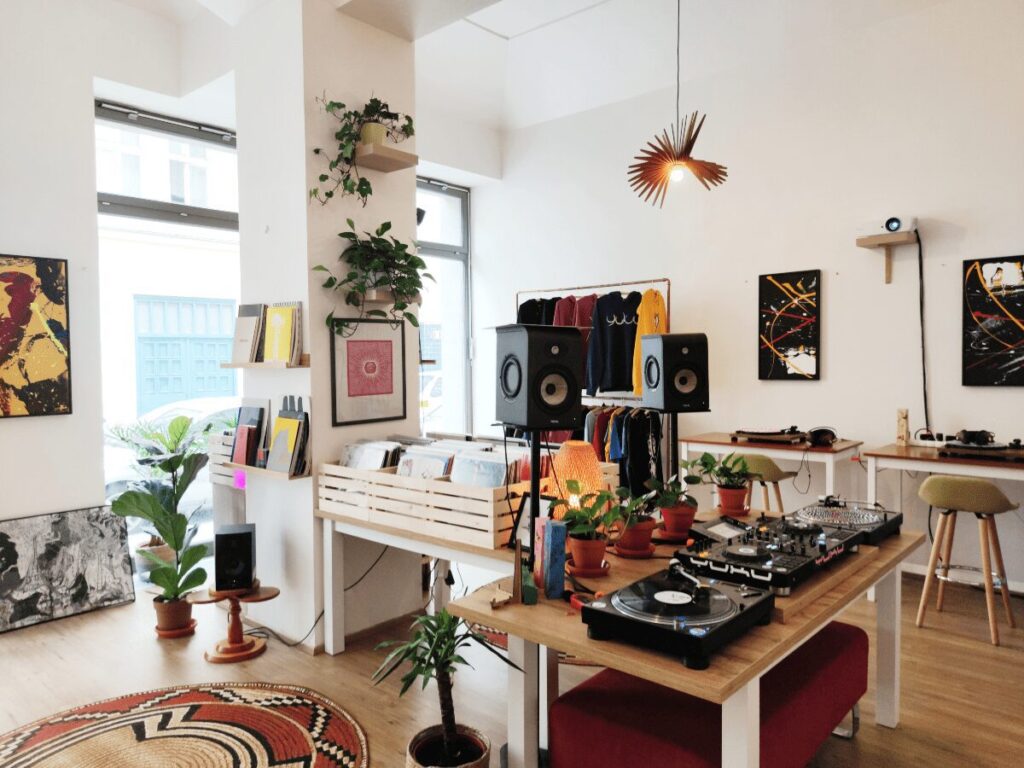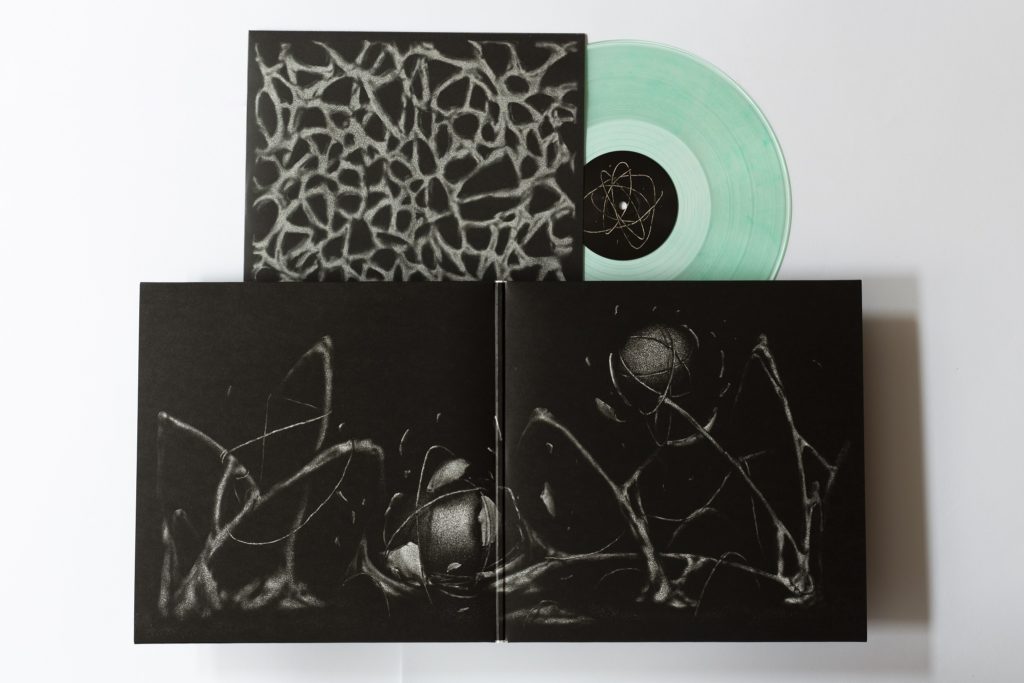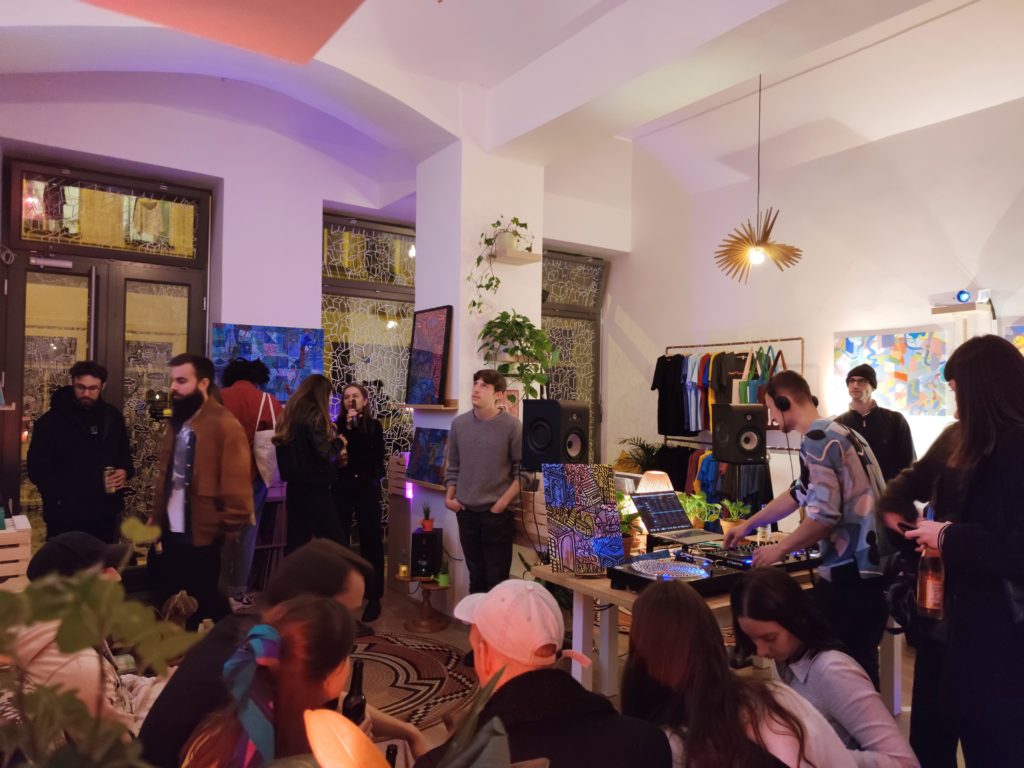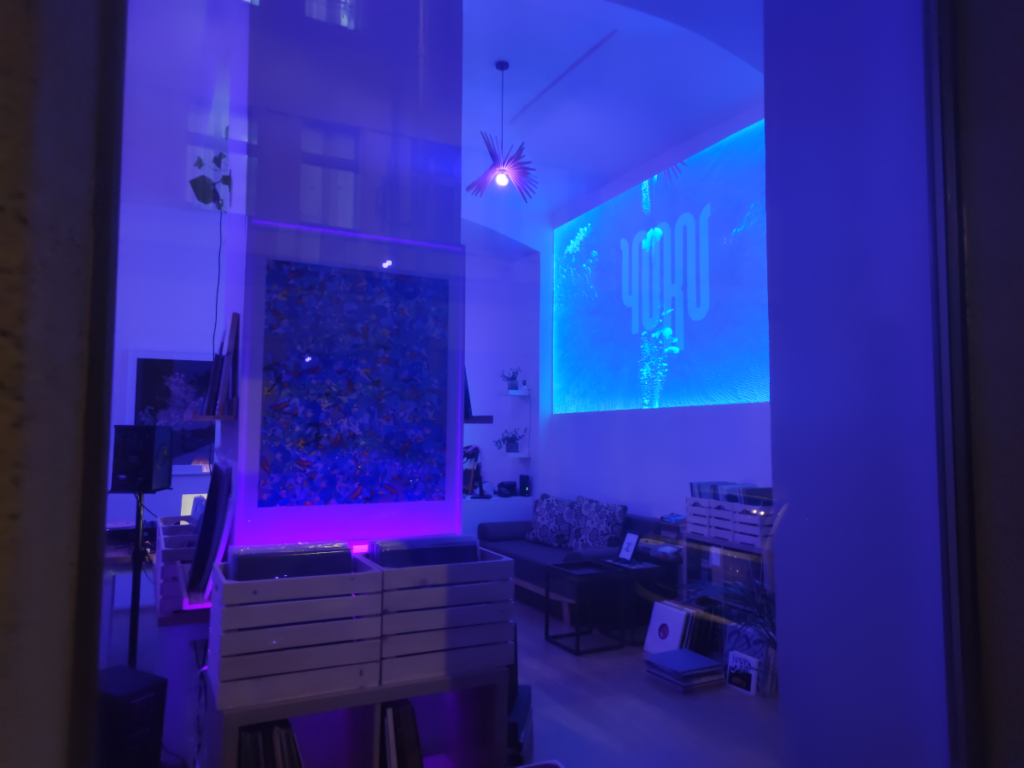How YUKU Is Staying Physical, Promoting Slow-Music Counterculture And Nurturing Curiosity [Interview] – FUXWITHIT

In the public debate, record label is a term that is increasingly taking on a negative connotation. We come across more and more outrageous episodes that expose how broken the music industry is and how much labels at every level have a starring role in this situation. Sometimes it’s easy to get caught in the flow and forget that one size doesn’t fit all. Here at FUXWITHIT we do our best to support and promote positive examples, but it is important to remember that there is a lot more good out there. Projects that not only help create a healthy environment where art can thrive but that propose cultural models and approaches that vary from the mono-dimensional “presave link – new music Friday” routine we’re getting used to.
A few years ago, one of my Bandcamp expeditions led me to come across YUKU, a label first, and now also a record shop and gallery located in Prague, Czech Republic. Like few others, YUKU was able to catalyze my attention and it quickly became my personal model of the perfect record label. Although Ilda and Jef, the founders, repeat that what they do is largely “nothing new”, YUKU is distinctive in many ways. Even passing over the exceptional musical (some examples here and here) and aesthetic taste that characterizes its young catalog, just the dedication instilled in making these incredible vinyl is something not so common in the world of bass music. Furthermore, the subscription model at the core of the label it’s another element that places YUKU in a league of its own.
What fascinated me the most, however, were the cultural values the label is committed to. Jeff and Ilda have very clear ideas about the principles that serve as the foundation of their vision: “YUKU is an open and accepting forum of ideas, expression, and creativity that allows for those who are willing to drink in the emotions and concepts being communicated—an island of experience and stimulation for the kinds of people who like to be surprised, those who aren’t satisfied to hear and experience the same things time and time again, an oasis in the never-ending sea of digital information”. Even if they are exposed in a lyrical way, these are extremely current themes. When we talk about music, technology and business are almost always the topics that come up first, relegating the artistic and cultural component to a secondary role when it should be exactly the other way around. And flashy actions like Spotify removing the shuffle button as a default option from albums doesn’t make things better. We need examples that are able to connect all the dots in smart, art-friendly ways.
In this chat, I dive into the reasons that pushed Ilda and Jeff to build YUKU this way, the role of YUKRU (their subscribers’ community) and how their vision fits in the contemporary music industry. It turned out to be a bit of a cultural discussion, a business lesson, a sociological talk, but always with the passion for music as the focus.
This might sound like a weird question to start off but how do you define YUKU? For sake of simplicity, I usually call it a record label, eventually a brand, but I believe it’s much more than that.
YUKU is something of a multifaceted art platform that’s here to bring the ideas of the artists who release their music on it to life in physical form. While for listeners, it’s a space and community to explore music and art with. It’s both a record label and a physical space that people can visit, which gives us lots of possibilities when it comes to community building. We avoid thinking of it as a brand, particularly as we don’t really have any kind of consistent branding. We prefer to think of it as a group of people who love to be curious and keep an open mind.
Records that take longer to connect with and find the right space and mood to listen to are sometimes the ones that end up haunting your personal selection for the longest, and they can really endure.
In the increasingly digital and “all you can eat” music industry, when creating YUKU you have taken a completely opposite direction that focuses on physical formats and exclusivity. Why? Was this decision a result of rejection against the most popular models or did you spot new possibilities?
We wouldn’t say that we focus on exclusivity because everyone can either pick up the vinyl (most of them tend to sell out over the course of months rather than days) or buy the music through Bandcamp or elsewhere, and even listen to it through digital/streaming platforms when the music hits its release date. One element that you could consider somewhat exclusive is the benefits that our YUKRU subscriber’s family enjoys while we’re waiting for the records to be manufactured. The vinyl manufacturing process currently takes between 5–7 months, and the YUKRU do exclusively get to enjoy the digital releases in that time, but the rest of the world gets the music at the point that it would always be released, with or without the YUKRU existing. Our concept behind this is to release the music to a smaller group of trustworthy, open-minded, and curious people in that waiting period for the vinyl rather than just sit on the music ourselves and not put it in front of any ears in that time. As a listener, knowing that you have a piece of music before the rest of the world for 6–7 months means that you’re likely to spend more time with it and connect with it on a deeper level—maybe even give more chances to get to understand something that you don’t connect with from the outset. Records that take longer to connect with and find the right space and mood to listen to are sometimes the ones that end up haunting your personal selection for the longest, and they can really endure. Having that group of listeners who are bonding with what we think is special music from the artists we work with creates a strong community at the heart of YUKU, and that connection with the music they develop is very much what we are trying to elicit.
We think the art of listening and connecting to music has been devalued for many over time due to its abundance and the ways in which it is consumed, and we hope to contribute to a small-scale “slow-music” counterculture, much like what exists in the slow-food and slow-fashion worlds. And we aren’t alone in doing this, there are plenty of people who feel the same and are working toward the same thing, which is great. We wouldn’t say that it’s something entirely new or remarkable, we’re just doing it in our little niche and in our own way with our tastes. While we do release music regularly, with one or two releases per month, the bonds that the listeners at the heart of YUKU build with that music are deeper than usual, we think, and quite special.

With the sentence “the art of listening and connecting to music has been devalued” you’ve introduced a broader critique toward the music industry that reports how art is often free of “context.” A situation where, quoting your own words, “music is just another track in a playlist, and the visual artwork that accompanies it’s relegated to be a thumbnail in the corner of a player”. What do you do to change this when you prepare a YUKU release?
Understanding the artist’s vision is the first and most important part — how they want the release to be presented visually (if they have specific visual artists they want to work with, or if they are visual artists themselves) and also sonically (because we work with multiple mastering engineers who all have their own unique edge). Aside from that, the process is different for every release because we’re always working with different visual artists, each record is unique, and different artists have different preferences for how they want to collaborate — we always adapt to that. At each step along the way, we’re communicating with the artists and ensuring that everything either matches or surpasses their expectations.
How did the first artists you contacted react when you proposed this release model?
From the perspective of artists, the most important thing is often confidence. Confidence that their ideas will be brought to life and realized in a way that matches their vision, carefully handled and that they will be paid fairly and regularly. We always try to go as far as we are able with developing concepts and bringing their ideas to life, and we hope that this is visible in the results, both physical and digital. We pay really careful attention to the details of mastering, artwork, the overall concept, and try our best to get each release to the right ears. In terms of paying the artists we work with, our unusual model means that they get fairly paid for their work and creations, and we update the accounts in a transparent way on a regular basis. We also inform the YUKRU when we pay artists, so they can feel confident that their subscription fees are getting distributed fairly and going to the right places. So to answer the question, having assured them of this, and now with some time having passed and them seeing the reality of it, they responded to this fresh approach very positively and embraced it.
Personal interaction and connection are at the heart of what we’re trying to achieve, and you can easily lose that at larger scales.
What blew my mind when I got familiar with YUKU was discovering that to become a YUKRU you not only have to make an application and interview but that you also reserve the right to decline the membership if you think that someone doesn’t fit the requirements. In a world where the obsession of many is to gain more and more fans, this behavior is very unusual. Why this additional barrier and why the number of spaces is limited?
The application and chat that we have with each potential YUKRU member are mostly there to ensure that they know what they’re signing up for and aren’t just joining to get a single release or with the expectations that we release a limited range of genres. What we’re looking for specifically is open-minded listeners who enjoy being surprised and exploring new things rather than those with fixed expectations who might not enjoy the range of genres and sounds we’re releasing. Having listeners with an open-minded mentality at the heart of the label is essential for us, and more importantly — for the artists — so they can feel free to experiment and explore new ideas. The number of spaces is limited simply because we want to know who the members of that community are, and if it were to become too sprawling, that nice element would be lost. Personal interaction and connection are at the heart of what we’re trying to achieve, and you can easily lose that at larger scales.

You give a lot of relevance to the “surprise element.” You explicitly demand from your subscribers the will and desire to be surprised. In this world where everything can be found online (even before it is officially published by the owners) and where hype rages without control, do you agree that the lack of patience and naivety is a serious problem?
We would only talk about our personal experiences and preferences. We think it’s easy to forget how to really listen in these times where there’s so much music and art out there, and when we’ve been somewhat trained by social media to consume things in a way that triggers dopamine. With djing, it’s also possible to start looking at music in a purely functional way over time, and start chasing just drops, select music this way, and also forget how to really listen to a tune or album and enjoy the journey. We definitely noticed this kind of behavior in ourselves in the past, and through YUKU we’re pushing back against that and rediscovering our own patience at the same time as creating a space and environment where hopefully others can, too. There’s a wealth of amazing art out there to be discovered and enjoyed, the important thing for us is to not be overwhelmed and get back on that dopamine rush, and to sit back, take time, and focus on really listening to or enjoying the art we want to connect with.
Let’s keep talking about YUKRU. Since they have no power of choice as to what they will receive while subscribed to the label, they have decided to blindly trust you. Does this perspective put pressure on you, especially knowing that out there there are millions of songs and albums available basically for free?
We hope it’s not blind trust, but rather putting together the pieces of what’s already out there from us and trusting us on the basis of that. In the beginning, of course, this was more difficult as we were just getting started and no-one had a clue what we might be doing or where we might go with the concept, but the label dives (mixes where they premiere the releases of the following months) were there to show people and inspire that kind of trust, as well as give an overview of our direction. We will continue doing this in the future, and we’re in the process of planning the next one. By now, we hope that we’ve given listeners an idea of the range of music we’re working with in a pleasant enough way that they understand where we’re coming from, as well as the hopefully indefinable way, when it comes to genres, that we’re heading. We hope that the quality of what we’re attempting to do is what they see, hear, and understand. So we don’t feel pressure, but we do certainly feel a responsibility to deliver art that will provoke feelings and reactions of all kinds, regardless of genre. We also try to strike a balance between releasing creations from established artists and also those of creators who are just starting out on their journeys. We don’t always seek perfection and don’t even really believe in that because it’s very subjective. Sometimes the heart and vibe of a concept are enough to carry it for us. It’s very rewarding to work with new artists and inspire confidence in them from the beginning. When an artist has this feeling of trust and confidence in what they are doing, they often create amazing art.
NFTs have recently re-introduced the concept of collecting and rarity into the digital music world, terms that until now were of exclusive relevance to physical mediums such as vinyl, cassettes, and CDs. Are you familiar with this technology? How do you feel about this new frontier?
It’s interesting to watch, but like any new technology, it’s still in a phase where it’s quite difficult to really determine how useful it will be. It’s not something that we are currently thinking of adopting. We’re already busy with our focus on art that can be physically interacted with when it comes to collecting. But who knows, if it becomes more compelling, finds an accepted and useful place, and valid reasons emerge to explore it, then why not. We can’t predict the future, and this technology certainly seems like it’s probably here to stay.

Your outlet in Prague is the physical heart of YUKU. I read that you’re planning to transport the in-shop experience online, so people all over the world would be able to enjoy in real-time what’s going on in the building via your website. Can you talk more about this plan and what it will involve?
It’s the focal point of a community of lovely people and curious listeners we’re building in Prague, and yes, we definitely want to start frequent live streams in the future. Everything is already in place for that, and it will be a bit like tuning into a vinyl radio show where you can also see what’s going on in the store… You’ll be able to listen to the records we’re listening to, and occasionally mixes from guests and us. With the pandemic still raging, we don’t really feel like now is a good time to do that though, and we prefer the store to be a haven of privacy where people can disconnect from the world. We’ll start with it hopefully next summer.
One of the projects that fascinated me the most is the IMAGINARY NUMBER series. Given how much people always crave for something new and exclusive it’s not a surprise that it was a success, but I have so many questions about it. How did you come up with the idea? How do you actually find the tracks? How do you promote them while keeping the artists anonymous?
We were really pleased to see the YUKU white label series definitely make an impact with the first release from Imaginary Number. You could say that it definitely reached the right ears. We’re just about to drop the second from two new names, Ikawa & Kliptown, who have two tracks each on it, mostly 160 bangers this time. While you could consider it exclusive in that it’s limited in number and only listenable to people who own record players (or the YUKRU, who get the digital files), this is pretty common in white label culture, and even for vinyl in general. There are plenty of vinyl-only releases out there in the world. The tracks of the series are really more club-oriented, and while the idea of releasing just on vinyl itself isn’t a new one by any means, and neither is the pseudonym element that gives established artists freedom to explore new directions, the idea just fit what we wanted to do with this music quite perfectly.
What next for YUKU?
We’re looking forward to welcoming some really great artists to the label next year, including Henry Greenleaf, Joaquin Cornejo, ROOO, Lazarus, Hidden Element, Leese, and more. Make sure to check out their existing releases! Also, TRAKA, who have brought two incredible releases to the label so far, and Granul, who released the amazing ‘Cypher’ with us, will be back with music that’s simply oozing freshness. There’s also Current Value’s next album which is something incredibly unique and represents a remarkable musical perspective from him. We’re also launching the first of a series of remix vinyl with some amazing artists involved.
Thanks for connecting with us, and we hope y’all enjoy what’s to come!
You can check YUKU’s online record store, which includes both music from the label and a range of curated records from other imprints and artists here and apply to join the YUKRU here.





